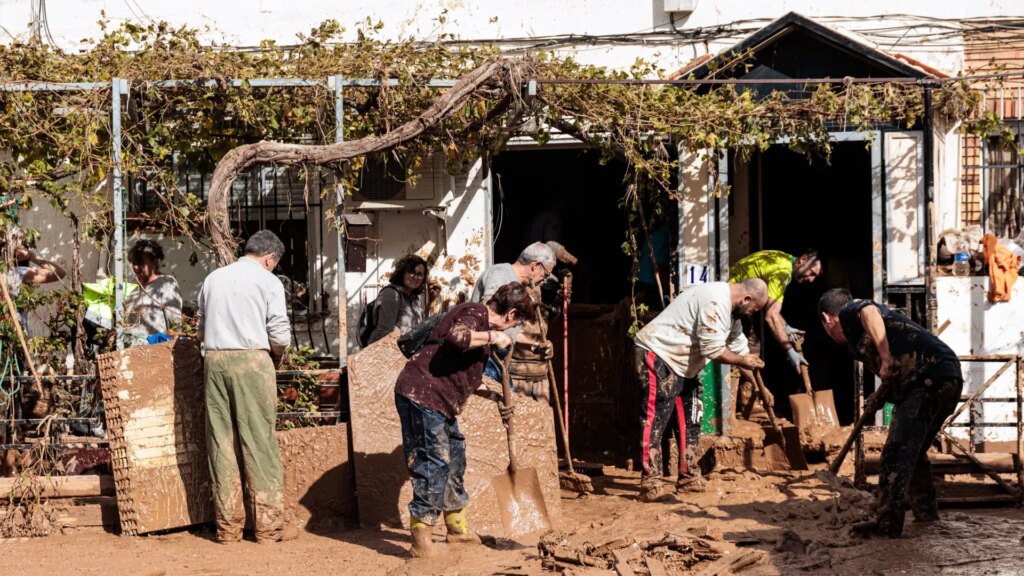“Only the people save the people”. Under this slogan, which has spread through social networks, thousands of citizens have united with the same objective: to care for those affected by the extremely strong DANA which has already left a toll of more than 200 dead, in addition to enormous material and personal damages in several municipalities of the province of Valencia. This Friday, from early in the morning, an improvised tidal wave mobilized spontaneously to the most affected areas to provide water and food or to help in the clean-up tasks. These reactions occurred in the midst of the anger of many of those affected by the management of the administrations.
Such was the flood of volunteers who went to the towns most affected by the floods that the Generalitat Valenciana had to ask its citizens for restraint and not to use their vehicles so as not to collapse the roads and allow the work of the emergency services, that this Friday continued to deploy. “The need for them to return to their homes is imperative.”asked the president autonomic Carlos Mazón to the people who were “taking to the streets” on foot or in their vehicles. Mazón thanked them for having “the best will” to collaborate with the victims, but explained that the public roads were “collapsing” and it was necessary to keep them clear to maintain the delivery of aid. Hours later, the Generalitat took the decision of to summon the volunteers this Saturday at seven in the morning. at the City of Arts and Sciences to “organize” the help in the best possible way.
The isolation of many of the municipalities most affected by the DANA is one of the major problems that the administrations are facing in order to provide aid to increasingly desperate residents. Citizens of towns very close to Valencia capital, such as Alfafar, Paiporta or Beniparrell, denounce the lack of supplies, food and other basic goods. in the face of a situation that is becoming increasingly tragic. “This is disastrous, we can’t even enter our homes. We have no food, we have no water, no one has come here, there are corpses on the ground,” complains a resident of the Orba neighborhood, in the town of Alfafar.
Much of the criticism focuses on the lack of attention to a tragedy that is being managed with means that seem insufficient. “It seems that Beniparrell is a town that does not exist on the map,” criticizes Laura, a citizen of that town. “No politician, not even the town’s own mayor, has passed through the streets to see how we are,” she complains. “Since Tuesday night, everything, absolutely everything, has been done by the neighbors. hand in hand, as we have been able to, with our tools and our effort”, denounces this neighbor, who describes how in her town “the school wall has fallen down, the streets are impassable” and “there is nothing” in the only supermarket in the vicinity.
The story told by Senia a few kilometers further north, in Alfafar, is very similar. “Here no one comes to help, we are doing everything among the neighbors.” laments this citizen, while another neighbor, Mari Carmen, explains that it is the local residents who are removing the cars that remain wrecked and piled up on the roads. “Between several men they are moving them by hand,” says Mari Carmen, another neighbor; or “farmers in the area who have tractors drag them and pull them out”.
500 more soldiers
In view of the lack of resources, this Friday the Minister of Defense, Margarita Robles, announced the dispatch of another 500 military personnel to the most affected area. by the DANA and promised that, in successive days, they will be incorporated “as many as necessary, without any limitation of means”. “Everything that can be done is being done and will continue to be done,” argued Robles, who explained that there are now about 1,700 troops working in the towns hit by the storm: the 500 sent this Friday and another 1,205 troops of the Military Emergency Unit (UME) present since the first day.
The leader, however, pointed out that “it is not so much a problem of the number of military personnelHe asked the public not to think “that the Army arrives and everything is solved”, because there are places where the situation is “absolutely impassable”. The mission of the deployed units, said Robles, is “to help dig out people who may be in basements or on first floors”, “to help drain the water in many places” and to open roads to allow transport so that food and water can reach populations that are “absolutely isolated”.
